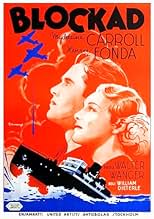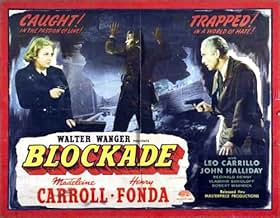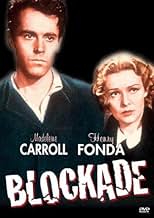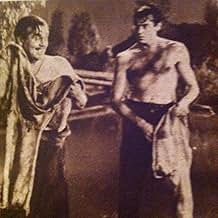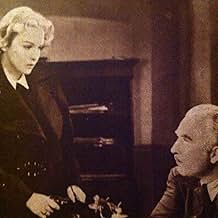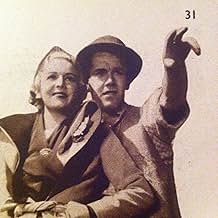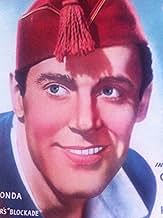Adicionar um enredo no seu idiomaA simple peasant is forced to take up arms to defend his farm during the Spanish Civil War. Along the way he falls in love with Russian whose father is involved in espionage.A simple peasant is forced to take up arms to defend his farm during the Spanish Civil War. Along the way he falls in love with Russian whose father is involved in espionage.A simple peasant is forced to take up arms to defend his farm during the Spanish Civil War. Along the way he falls in love with Russian whose father is involved in espionage.
- Direção
- Roteiristas
- Artistas
- Indicado a 2 Oscars
- 3 vitórias e 2 indicações no total
- Pietro
- (as Fred Kohler Sr.)
- Commandant
- (as Wm. B. Davidson)
- Cabaret Singer
- (as George Byron)
- Townswoman
- (não creditado)
- Direção
- Roteiristas
- Elenco e equipe completos
- Produção, bilheteria e muito mais no IMDbPro
Avaliações em destaque
For political propaganda that both entertains and persuades, let me suggest Casablanca. For political propaganda that offers only a few glimpses of the radiant Madeleine Carroll and nothing more, I recommend Blockade. That, unfortunately, is not enough to salvage this less than scintillating 1930s leftist pap.
Boasting the tagline 'the most important film of 1938' and having been awarded Oscars at the time of its release, I decided to watch this film and see what the fuss was about. What I found was a film that is too self-consciously cautious to be great fun, too worthy to be involving and ends up being rather dull and uninteresting. The basic plot is set around the Spanish civil war but it appears to have been careful about coming down on either side of the argument and therefore is so balanced that it almost cancels out any content that may have been challenging or informative. This leaves a story about personalities and the central romance, which is a problem because the film doesn't deal with these very well either. The romance tries to be bleak and supposedly doomed but it just can't get the tone right and it never really gets anywhere near as emotive as it needed to be certainly this is no Casablanca.
With the script problems and rather drab direction, the film only occasionally gets close to being really impacting and involving and it was only the moments where the horrors of the conflict are allowed to get above political neutrality that the film comes to life but these are too infrequent. The cast are set adrift and do the best they can to squeeze emotion and drama out of the script but their efforts just seem out of place against a rather flat backdrop. Fonda is always watchable even if his 'good honest man' is a rather dull character and, for that reason, hard to get behind; certainly modern audiences may find his unquestioning patriotism and simple morals hard to swallow. Carroll is better than the film deserves, her performance is very good and it is just a shame that the rest of the film doesn't come up to her level of work. Support is OK but the script doesn't fill the film that well and most of the cast are given little to do.
Overall this may well have been the 'most important film of 1938' but it doesn't do a great deal today. The film doesn't inform and isn't interesting as it carefully treads the complexities of the conflict and Fonda's final to-camera rant about peace is too little, too late and just comes across as being rather pat. The romance could have saved it but this too is fluffed despite the best efforts of Carroll, but Fonda, despite being worth a look, plays it all to simplistically in line with the material.
"Blockade" is a case in point. The script was written by John Howard Lawson, one of the most hard-line Communists working in Hollywood, about the Spanish Civil War, a cause dear to the heart of every leftist. And yet its script is so confused that it is impossible to tell whether its politics are pro-Republican or pro-Nationalist.
Marco, a small farmer living somewhere near the Mediterranean coast of Spain, takes up arms to defend his land against the Bad Guys, and then becomes part of the Good Guys' army. He takes part in the defence of Castelmare, a port city held by the Good Guys but being blockaded by the Bad Guys who are hoping to starve it into surrender. The plot revolves around the attempts of the Good Guys to send a ship through the blockade to bring food to the starving citizens, and the attempts of the Bad Guys and their spies within the city to frustrate this plan by sinking the ship.
No doubt if Lawson had had his way he would have written a script which made it quite clear that the Good Guys were to be identified with the Republicans, but the studio- who doubtless felt that actually making a film about the conflict was quite brave enough- were determined that they should not be seen as favouring one side against the other, and the script was therefore neutered so as to ensure that the question of who the Good Guys and the Bad Guys actually were remained obscure. The film makes no reference to the International Brigades or to foreign intervention in the war, and all personal names and place names are fictitious. (The name "Castelmare" is actually Italian rather than Spanish, as is "Montefiore", another place mentioned in the film. The hero's name in Spanish would normally be "Marcos" rather than "Marco", and there are also characters with the Italian-sounding names "Pietro" and "Seppo". Lawson seems to have got confused about the differences between Spanish and Italian).
There are some factors which do indeed suggest that the Good Guys are intended to be identified with the Republicans, in particular the fact that the Bad Guys carry out air raids against civilian targets, a typically Nationalist tactic. Some have also pointed to the fact that the chief Bad Guy spies, a young woman named Norma and her father, are of Russian origin, although it should be mentioned that not all Russian émigrés at this period were Tsarists or even right-wingers; there were plenty of Russian liberals, social democrats, anarchists and Trotskyites in exile from Stalin's regime. (Norma later has a change of heart when she sees the suffering the blockade is causing, switches to the Good Guy side and becomes Marco's love-interest).
Other factors, however, suggest that the Good Guys are intended to be identified with the Nationalists, and not only the design of their uniforms which another reviewer mentioned. Marco mentions that the Bad Guys are targeting churches for destruction, just as the anarchists and communists did in the regions of Spain under their control. His taking up arms in defence of his land recalls the fact that the leftist programme of collectivising land forced many small farmers, who otherwise would have had little sympathy with Fascism, to support the Nationalist cause, fearing that in the event of a Republican victory they would share the fate of the Russian kulaks.
Yet despite its political incoherence the film has some good points. Indeed, it is perhaps the film's refusal to take sides that makes it still watchable more than seventy years on, certainly more watchable than a mere Francoist or anti-Francoist propaganda tract would be. Certainly, it is dated, something shown in those scenes which supposedly take place outdoors but which were in fact shot in a studio in front of very unconvincing-looking backcloths. Although it ends with a rousing peroration from Marco in which he calls for outside intervention in the war, its main interest today is as an anti-war drama, a film which shows us the human cost of war, a cost which remains the same whether the war is being waged by Good Guys or Bad Guys. 6/10
Which was still going on when Blockade was made by Walter Wanger in 1938 and released by United Artists. Wanger had under personal contract at the time Henry Fonda whom he had brought to Hollywood to recreate his Broadway starring role in The Farmer Takes A Wife. After that during the Thirties he mostly rented Fonda's services out to the studios until Fonda signed a contract with 20th Century Fox to get to play Tom Joad in The Grapes Of Wrath.
One of the big problems is the casting of Henry Fonda as a Spanish peasant who joins the Republican Army and is the voice of the Spanish proletariat on screen. Fonda is just way too American in his speech to ever be convincing as anything else. As the voice of an American worker, Tom Joad in The Grapes Of Wrath, Fonda was perfect. As a Spaniard he just doesn't cut it. But he was certainly a bigger box office than the guy who should have played the part, Gilbert Roland.
While still just a peasant working his fields before war comes, Fonda meets up with Madeleine Carroll who is a Russian expatriate traveling through Spain to meet her father Vladimir Sokoloff and another family friend John Halliday. She doesn't know it, but the two of them are spies. And she gets roped into their espionage game as well.
The story of the Spanish Civil War is a complex one, but one of the failures of Blockade is that we never get any kind of background. Roughly speaking the bulk of the military staged a coup against the Republic of Spain and in the end which came in 1939, Francisco Franco emerged as a fascist dictator of Spain out of all the generals in revolt. But none of that is explained here in Blockade. All we know is that it's an amorphous 'them' out there making it tough on the peasants who are in fact supporting the constitutional and elected Republic of Spain.
Although the wholesale bombing of civilians had first been done in Ethiopia by the Italians, civilian bombing targets were first done in Europe in the Spanish Civil War. It was new and frightening and widely covered in the domestic and foreign press. The story of Blockade centers around a coastal town in which a relief ship cannot get through. The port may have to be surrendered and with it the whole province. It's what the Nationalists are working for and the Republicans like Fonda trying to prevent, though the names Nationalist and Republican are never used.
John Howard Lawson wrote the original script that got the Academy nod and he was one of the later Hollywood Ten and one who in fact made no bones about his Marxist sympathies. But this film has been so drained of politics that it's almost antiseptic.
I'd say Blockade is one for fans of the leads and an interesting if mediocre way showing how Hollywood handled a burning issue of the time.
The story doesn't take sides and was prohibited in some American cities in USA day since . Of course , it was also banned in Spain . The tale does not attempt to favor any cause in the present conflict. Care has been taken to prevent any costume of the production from being accurately that of either side in the Spanish civil war . The film was nominated Best Music, Original Score composed by Werner Janssen . Kurt Weill even wrote music for the original project that was never used. The movie can be seen nowadays as a War/romance/drama with some exciting images , well organized crowd and thrilling scenes . The topic of the Spanish Civil War was politically sensitive and there is some hint that the upheavals of the original project were due to the political content of the film. Much of the dialogue for the movie was supplied by the black-listed John Howard Lawson who was nominated ACademy Award for Best Writing, Original Story and novelist James M Cain (though uncredited and famous author of ¨The postman always rings twice¨) wrote interesting dialogs . The picture was professionally directed by William Dieterle but this film Blockade(1938) was too libertarian to keep him completely from the shadow of suspicion as a socialist sympathizer.
This German director had great artistic style and worked with much energy in providing some of Hollywood's and the world's crown jewels of cinematic art. He immigrated to the US and was in Hollywood by 1930s with the offer of directing for Warner Bros. and began directing their series of German-language versions of released films, including: Those Who Dance (1930), The Way of All Men (1930) and subsequently directing dramas (Scarlet down , Fog over Frisco , Fashions), costumer (Kismet,Omar Khayyan) and biopics (Life of Emile Zola , Dr Ehrlich , Juarez , Madame Curie , Reuter) that were a revelation at the box-office. Dieterle some of Warner's American output (his first, The Last Flight (1931), is now regarded as a masterwork) which would ramp up to his being at the helm of six pictures a year through 1934. After that , he directed an extravaganza ,William Shakespeare's "A Midsummers Night's Dream" . Dieterle would direct Paul Muni for Warner's in three first-rate Bio movies: The Story of Louis Pasteur (1936), The Life of Emile Zola (1937), and Juarez (1939) Oscar nominations in all of them. After that , Dieterle moved on to do The hunchback of Notre Dame (1939) at RKO with Charles Laughton as Quasimodo that was one of Dieterle's best efforts . Through the 1940s, Dieterle moved around among the studios executing always vigorously wrought film work, such as, two 1940 Bios with Edward G. Robinson at Warner's. He became associated with independent producer David O. Selznick and actor Joseph Cotten first with his direction of I'll be seeing you (1944). Rating 'Blockade' : 6 , acceptable and passable . Worthwhile watching .
Você sabia?
- CuriosidadesThe original title of this film was "The River is Blue" and the director was to be Lewis Milestone. Kurt Weill even wrote music for the project that was never used (lyrics by Ann Ronell). The title was changed to "The Rising Tide" and "Castles in Spain," then finally to "Blockade." The topic of the Spanish Civil War was politically sensitive and there is some hint that the upheavals of the original project were due to the political content of the film.
- Citações
Marco: [last lines, after being told to find peace] Marco: Peace? Where can you find it? Our country's been turned into a battlefield! There's no safety for old people and children. Women can't keep their families safe in their houses; they can't be safe in their own fields! Churches, schools, hospitals are targets! It's not war; war is between soldiers! It's murder! Murder of innocent people! There's no sense to it. The world can stop it! Where's the conscience of the world?
- ConexõesFeatured in A Hollywood Vermelha (1996)
Principais escolhas
Detalhes
Bilheteria
- Orçamento
- US$ 692.087 (estimativa)
- Tempo de duração1 hora 25 minutos
- Cor
- Proporção
- 1.37 : 1

